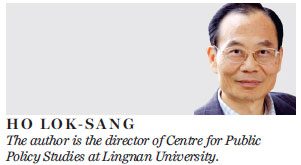Objections to reform unjustified
Updated: 2015-06-16 08:56
By Ho Lok-sang(HK Edition)
|
|||||||
Ho Lok-sang argues that those opposing electoral reform are making unfair criticisms while ignoring that universal suffrage will make the CE more accountable to people
I am puzzled why people object to the SAR government's constitutional reform package. Will those who oppose it consider the following questions?
First, there is the objection that since there is pre-screening by the Nominating Committee the package must be "fake universal suffrage". But calling it "fake universal suffrage" for this reason is totally unacceptable. Some pre-screening to ensure candidates who run for Chief Executive accept the current political system on the mainland is perfectly reasonable. Moreover, central government officials have said that Beijing does not object to "pan-democrats" running for the CE post - as long as they do not challenge the central government. So why won't more Hong Kong people trust Beijing's word on this?
Some "pan-democrats" ask: Why won't Beijing trust Hong Kong people to elect a CE who will not challenge the political system on the mainland? They need to remember that Beijing faces the very difficult task of ensuring the stability of a society of 1.3 billion people. The stakes are too high for the central government to just assume that an open election will not result in someone being elected who calls the ruling party dictatorial, authoritarian, and who advocates Hong Kong's independence. If this should happen, separatist forces on the mainland could gain strength and the internal situation there could deteriorate.
Is it too much to ask of candidates for the CE post, if they are elected, to do a decent job serving Hong Kong people - as they were entrusted to do by the central government?
Beijing says doing this job faithfully and earnestly is "patriotic". Is this a misuse of this word? Why are people so sensitive about this word? Indeed, when it was used in the State Council's white paper on "One Country, Two Systems" policy in Hong Kong, some people claimed Beijing was eroding the foundations of "One Country, Two Systems".
The "One Country, Two Systems" framework implies that Hong Kong people should not challenge the political system on the mainland. But some Hong Kong people openly challenge it. Some even blatantly demand independence from the country. Yet they claim Beijing is eroding the "One Country, Two Systems" principle! Beijing argues that such people are in fact eroding the "One Country, Two Systems" principle. Now, whose claims are more honest?
Who in their right mind would slight achievements made by the country's leaders over the years in serving the Chinese people? They have lifted hundreds of millions of people out of poverty, extended free education to all children on the mainland, lifted the life expectancy to 75 years (which is higher than India's 66), and greatly improved personal freedoms.
Here is a direct quote from the US-based Pew Research Center's report in 2012:
"Nearly six-in-10 Indians (59 percent) say they are dissatisfied with India's direction; only 38 percent are satisfied. This is a 13 percentage point decline in satisfaction since last year, one of the greatest drops in satisfaction among the 17 nations surveyed by the Pew Research Center in both 2011 and 2012. Indian satisfaction now trails that in China (82 percent), Germany (53 percent) and Brazil (43 percent), but still exceeds that in the United States (29 percent)."
Venture capitalist Eric Li has said China is a meritocracy: It is a nation ruled by elites who have demonstrated they are capable. While China's regime is not rule by the popular vote, Li says that China's ruling party has built up its legitimacy based on its performance. Mainland residents now travel freely and China probably is the world's largest source of tourists. Chinese people are enjoying their highest level of personal freedom in the country's history. They can choose their jobs, when and who they will marry and can adopt different religions freely. Many foreigners now also find the country attractive enough to want to make China their home.
The Nominating Committee mechanism may appear to be unfair to some people. But it is in the Basic Law. Prescreening candidates to ensure they do not challenge the political system on the mainland is absolutely reasonable. In the long-term, the screening mechanism should improve, but the bottom line is that candidates need to respect the "One Country, Two Systems" framework. Given that the SAR was developed under the blessing of "One Country, Two Systems", is this too much to ask of the candidates for the top position in Hong Kong?
I was a speaker at a forum on constitutional reform last Friday. A member of the audience said she was worried that approving the reform package could lead to Hong Kong people "falling over a cliff". But why will "Hong Kong people fall over a cliff" under this proposed system? We should not be scared by alarmist politicians! Universal suffrage will make the CE more accountable to the people of Hong Kong. If an elected person does a poor job he or she can be voted out!
Another speaker, lawmaker Alan Leong, was concerned about CE aspirants who might be screened out under this system. But these fears are unfounded. For as imperfect as the package may be, why veto reforms that will make the CE more accountable to the people?

(HK Edition 06/16/2015 page11)